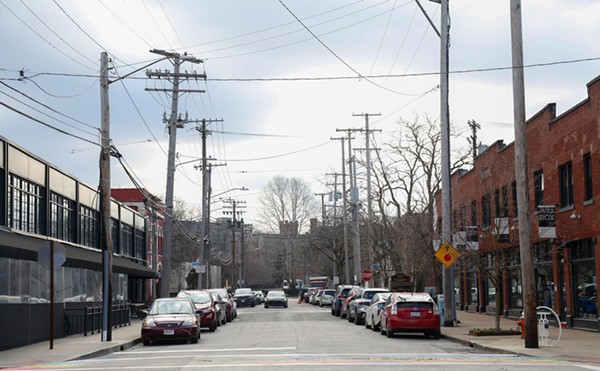The Legal Aid Society of Cleveland and the ACLU of Ohio today filed a federal lawsuit that alleges the suburb of Bedford's nuisance ordinance is unconstitutional and discriminatory. The suit specifically says the city used its ordinance to label the apartment of a black woman named Beverly Somai a nuisance after she had called the city to complain about a loud neighbor who intimidated her. Once that happened, her landlord evicted her.
Via the ACLU:
Co-counseled with ACLU Ohio, Legal Aid’s client is a single mom who has an adult son with disabilities. She has not engaged in any criminal activity, but Bedford still determined that by calling the police for help to deal with a noisy neighbor who also engaged in intimidating conduct, the premises were labeled a “criminal nuisance.” Rather than provide assistance in response to her requests for help, Bedford has pressured her landlord to evict her, as it has done numerous times with other similarly situated residents. Though it is the property that is technically determined to be the criminal nuisance, the client is essentially being labeled a nuisance since she is suffering the devastating consequences.
Bedford is one of 21 Northeast Ohio cities with Criminal Activity Nuisance Ordinances on the books, and one of just four that includes domestic violence in the statutes.
Nuisance laws came in vogue in the early 2000s, with cities enacting them to protect some vague sense of decency and community standards. They are, by definition and practice, pretty broad, which means that for every intention of, say, shutting down a drug house, they also became a magnet for barely veiled racism, as well as a tool cities can use to force out renters and those with subsidized housing vouchers. Studies have routinely found they unfairly harm minorities and those with mental health issues, among others.
Most include a specific set of offenses that can be cited, resulting in warning letters, fines and eviction. In some cases, unpaid fines can also result in criminal proceedings.
Domestic violence is already an underreported crime, but for those that do call 911 to report domestic violence in Bedford, it counts as a nuisance activity, logged by the city's law department, which can lead to fines and evictions.
“People should be able to pick-up the phone and call police for help: laws should not be used to penalize, deter, and harass ordinary residents for exercising rights under the United States and Ohio Constitutions to speak about their concerns, ask for police assistance, and petition the government for redress of grievances,” said Legal Aid attorney Jennifer Sheehe.
If it all sounds like a recipe for discrimination, that's not surprising, given how these laws were born and how some, including Bedford's, were triumphantly announced without even trying to hide their racist origins.
When its CANO was passed in 2005, the mayor explained: "One of the things that we take pride in is middle class values. We believe in neighborhoods not hoods. That is one of the reasons we passed that nuisance law tonight. I have made mention of the students walking down the streets and those are predominantly African American kids who bring in that mentality from the inner city."
For 14 years now, as recent public records show, the city has used the law to punish victims of crime.
Some examples:
a. In June 2018, Bedford sent a nuisance letter to a property owner about a female tenant who had called for police assistance to deal with an abusive, harassing ex-boyfriend, including an incident where he kicked in her door.Those dealing with mental health issues and events fare no better:
b. In another case, a landlord was fined $250 after their female tenant called the police after her ex-boyfriend “continues to harass her” by coming to her house without her consent.
c. In February 2018, Bedford sent a nuisance letter after a woman repeatedly called the police to report a series of physical attacks from her boyfriend.
d. In 2017, Bedford police sent a nuisance letter to the owner of a rental property complaint that the police had to respond to the property 5 times based on disputes between the tenant and her husband.
e. Bedford police sent a nuisance letter to the owner of a rental property for responding twice: (1) tenant’s male “friend pulled her hair and won’t leave” and (2) neighbor complains about a group making noise outside, but “all quiet on arrival.”
f. Bedford fined the owner of a rental property $2700 for failing to abate alleged nuisances all of which arose out of domestic assaults. The police reports note that the property owner is planning eviction and is upset about being unfairly billed under the nuisance ordinance.
g. In 2013, Bedford fined a rental property owner for two police responses arising out of domestic violence altercations where the victim was the tenant.
a. For example, in 2018, a nuisance letter was sent about a mother who called for assistance with her son who was experiencing a mental health crisis.
b. In another 2018 case, a mother was fined $250 for calling for assistance with her daughter who was bipolar and amidst a crisis.
c. Also in 2018, another resident called the police three times stating that he was attacked. The police determined that the resident was “mental” so they sent a nuisance letter to his landlord.
d. Bedford designated a property as a nuisance based on several acts of non-criminal activity that led to requests for police help: 1) a neighbor’s phone call about the resident’s “psychiatric situation” when the resident had “slit her wrists,” 2) a “personal welfare check,” conducted at a friend’s request, on the resident who had not been able to afford her medications, and 3) the resident’s distress over being called “crazy” and her failure to take her medication in several days.
e. Bedford fined a property owner $250 because a renter called the police out of concern that her boyfriend was suicidal. The city had previously designated the property as a nuisance after the tenant had sought help for her boyfriend after he threatened to kill himself.
Today's lawsuit asks that Bedford's entire ordinance be struck down.















